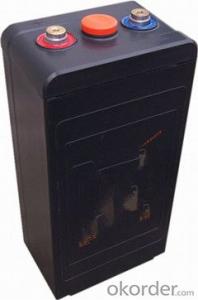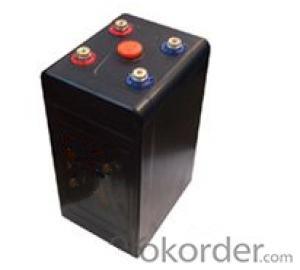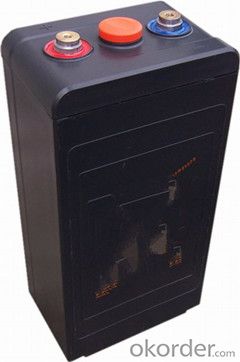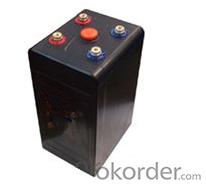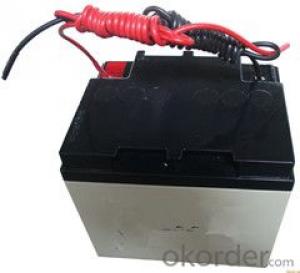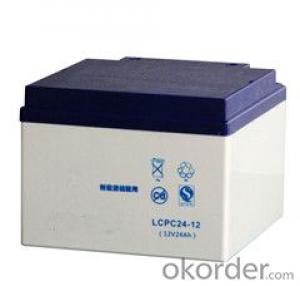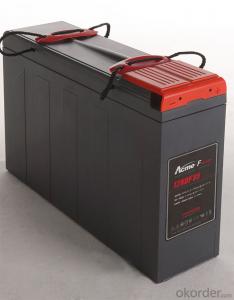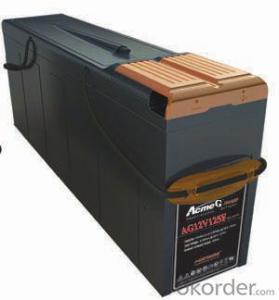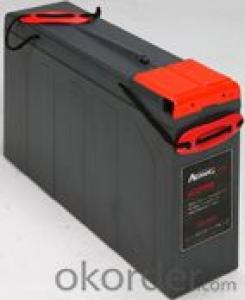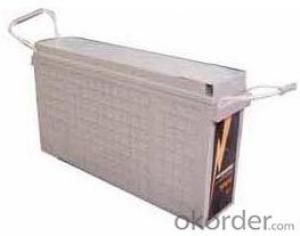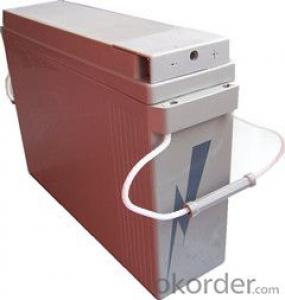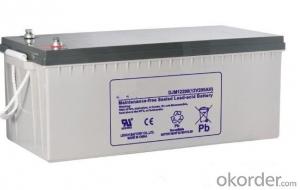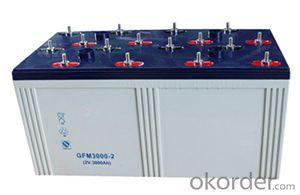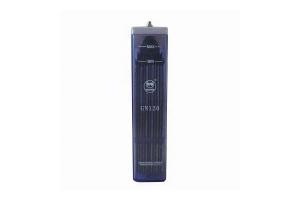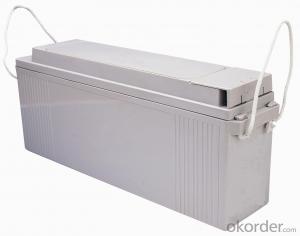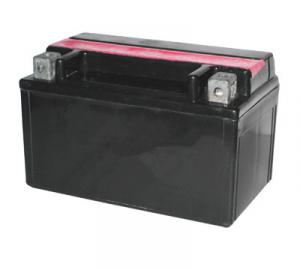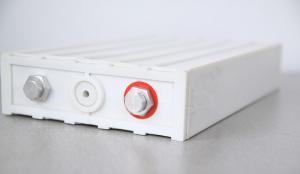battery the EosG series batteries EosG600
- Loading Port:
- Shanghai
- Payment Terms:
- TT OR LC
- Min Order Qty:
- 1000 unit
- Supply Capability:
- 6000000 unit/month
OKorder Service Pledge
OKorder Financial Service
You Might Also Like
Range summary
The EosG range of gel technology batteries offers outstanding performance including a 15+ years design life .
The EosG series batteries is designed based on the Eos series.
Using the polymer gel electrolyte .
Built to the highest standards and compliant with the latest IEC60896-21/22 standard .
This range also offers 100% capacity out-of-the-box and is capable of handling deep discharges for complete peace of mind. The use of flexible connectors and the ability to be installed both horizontally and vertically allows for multiple installation possibilities.
Technical features
Above 15 years designed life
Reliable post sealing structure
Excellent charging acceptant ability
Excellent performance at extreme high and low temperature
Low self-discharge ability
Flexible and convenient installation with slinky outside looking
Type: | EosG600 | |
Voltage: | 2V | |
Nominal Capacity: | 600Ah(C10) | 600Ah(10 hours rate:) |
Length: | 223mm | |
Width: | 184.5mm | |
Height: | 360.5mm | |
Height with termial: | 372mm | |
Weight: | 35.5Kg |
Compliant standards
IEC60896-21/22
BS6290 part 4
Telcordia SR4228
Eurobat guide
UL
Manufactured under system ISO9001(TUV)
EN 50272-2 or local equivalents
Correspondence exchange and transmission system
Mobile communication system
Power plant and power transformer system
Navigation and signaling system
Solar energy system
Radio and broadcasting station
Emergency lighting system
Plate special patent calcium and tin lead alloy and thick plate design
Container ABS(V0 optional)
Separator AGM
Valve EPDR
Electrolyte using the polymer gel electrolyte
Terminal M8 copper core posts
Battery installation compliant with:
Main applications
Products characteristics:
FAQ
![]() What is sulfation of batteries?
What is sulfation of batteries?
Sulfation is the formation or deposit of lead sulfate on the surface and in the pores of the active material of the batteries' lead plates. If the sulfation becomes excessive and forms large crystals on the plates, the battery will not operate efficiently and may not work at all. Common causes of battery sulfation are standing a long time in a discharged condition, operating at excessive temperatures, and prolonged under or over charging.
![]() How long a battery can last?
How long a battery can last?
The service design life of a battery are vary considerably with how it is used, how it is maintained and charged, temperature, and other factors.
![]() Do batteries self-discharge when not in use?
Do batteries self-discharge when not in use?
All batteries, regardless of their chemistry, self-discharge. The rate of self-discharge depends both on the type of battery and the storage temperature the batteries are exposed to. However, for a good estimate, Narada batteries self-discharge approximately 4% per week at 80ĄăF.
- Q: What is the difference between a maintenance-free battery and a conventional battery?
- Different materials will produce a different phenomenon: the traditional battery in the course of the use of the phenomenon of liquid reduction occurs, because the antimony on the grid will pollute the sponge on the negative plate of pure lead, weakened after the full charge of the battery Electromotive force, resulting in excessive decomposition of water, a large number of oxygen and hydrogen, respectively, from the positive and negative plates to escape, so that the electrolyte reduced. With calcium instead of antimony, you can change the fully charged battery back electromotive force, reduce the overcharge current, liquid gasification rate decreases, thereby reducing the loss of electrolyte.
- Q: What are the technical parameters of the battery?
- The main performance parameters of the battery are the following: model; voltage; battery capacity; battery type, such as lead-acid batteries, alkaline batteries, lithium batteries, solar cells, fuel cells.
- Q: How to determine the battery is good or bad?
- Observe the battery electrolyte is turbid, turbidity that the battery positive plate softening. Observe the bottom of the battery whether there is sediment, if the plate off the battery capacity has been inadequate. Hand hit the battery two electrode piles If you hear an empty voice that pole pile and plate break. With a thick wire short-circuit positive and negative pile observation of the battery filling holes, such as the discovery of a bubble appears that the interval has been damaged.
- Q: How to deal with waste batteries?
- The rest of the various types of waste batteries are generally shipped to a special toxic, hazardous landfill, but this approach not only cost too much but also cause waste, because there are many useful raw materials available.
- Q: What are the hazards of battery over discharge?
- Crystalline conductivity is poor, and bulky, will clog the pores of the battery plate, affecting the battery electrolyte penetration and exchange, but also further increase the battery resistance, a long time will prevent the battery power and chemical energy Of the reversible conversion, resulting in poor recovery of the battery charge, the battery was seriously damaged, or even unable to repair until scrapped.
- Q: What battery does the van use?
- The most obvious feature of lead-acid batteries is the top of the plastic cover can be unscrewed, there are ventilation holes above. These fillers are used to fill pure water, check the electrolyte and the use of exhaust gas. In theory, lead-acid batteries need to check the density of each electrolyte and the level of liquid, if there is a need to add distilled water. But with the upgrading of battery manufacturing technology, lead-acid battery development for the lead-acid maintenance-free batteries and colloidal maintenance-free batteries, lead-acid batteries do not need to add electrolyte or distilled water. Mainly the use of positive electrode to produce oxygen can be absorbed in the negative oxygen cycle, to prevent water reduction. Lead-acid water batteries are mostly used in tractors, tricycles, car start, etc., and maintenance-free lead-acid battery wider range of applications, including uninterruptible power supply, electric vehicle power, electric bicycle batteries. Lead-acid batteries according to the application needs to be divided into constant current discharge (such as uninterruptible power supply) and instantaneous discharge (such as car to start the battery).
- Q: What is the meaning of the battery above 12v65Ah?
- 12V represents the rated voltage. 65Ah indicates that the battery capacity (ie 1 ampere current can be used for 65 hours).
- Q: 80ah how much battery storage capacity?
- The size of the battery storage power refers to the battery capacity. Battery capacity is generally calculated in AH (safety). You 80Ah battery capacity is 80Ah, meaning that if you discharge current to 80A, you can put an hour.
- Q: What is a maintenanceable battery?
- It also has a shock, high temperature, small size, self-discharge characteristics. Life is generally twice the ordinary battery.
- Q: How does battery activation work?
- If you are talking about dry batteries, that is, to add sulfuric acid can use the battery (commonly known as water bottles), then it is because the long-term storage so that a high degree of oxidation of the negative board, plus acid will be a high temperature, Low, you can add acid in the pool after the addition of a small current for a long time to charge, you can solve. Generally with 0.05C charge to 3 times can be.
Send your message to us
battery the EosG series batteries EosG600
- Loading Port:
- Shanghai
- Payment Terms:
- TT OR LC
- Min Order Qty:
- 1000 unit
- Supply Capability:
- 6000000 unit/month
OKorder Service Pledge
OKorder Financial Service
Similar products
Hot products
Hot Searches
Related keywords
